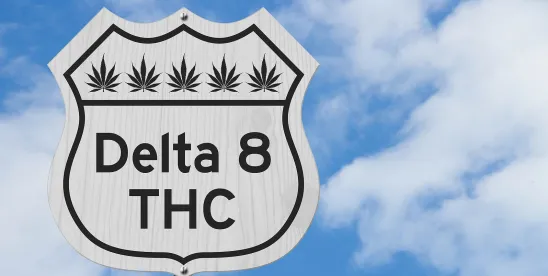Recent state and federal rumblings lead us to believe we may finally have some resolution to the uncertainty surrounding the legality of hemp-derived synthetic THC products, including without limitation, delta-8 THC, as an amendment to the 2018 Farm Bill has been proposed to clarify the loophole allowing for the sale of such hemp-derived products.
When the 2018 Farm Bill was enacted in 2018, it removed hemp, defined as cannabis (Cannabis sativa L.) and derivatives of cannabis with low concentrations (no more than 0.3 percent tetrahydrocannibinol (“THC”) on a dry weight basis) of the psychoactive compound delta-9-THC, from the definition of marijuana in the Controlled Substances Act (“CSA”). Hemp comes from a cannabis plant, just like the delta-9 THC producing marijuana plant, but a hemp-cannabis plant refers to cannabis plant that contains 0.3 percent or less of delta-9 THC. Delta-9-THC is the compound generally responsible for the psychoactive effects of cannabis that is subject to the CSA. A typical marijuana-cannabis plant on the other hand, can have anywhere from 15 to 30 percent of delta-9 THC.
After the 2018 Farm Bill went into effect, an apparent loophole emerged—resulting in widespread production and sale of psychoactive “hemp” products, as 2018 Farm Bill did not specifically address the legality of other compounds in hemp, including the less potent delta-8 THC, and the sale of products including such hemp-derived compounds. As such, many manufacturers jumped on the opportunity, and hemp-derived delta-8 products soared in popularity over the last few years. These products have become widely available in liquor and convenience stores since the passage of the 2018 Farm Bill, resulting in remarkable growth in the U.S. market for delta-8 and other hemp-derived cannabis products over the past three years. Total sales of hemp-derived products jumped from just $200.5 million in 2020 to nearly $2.8 billion in 2023, with the entire market estimated to be worth $28 billion.[1]
However, the hemp-derived market has faced intense criticism, particularly from licensed operators in the marijuana industry, as well as consumer safety enthusiasts. Marijuana producers and retailers are some of the loudest voices calling for regulation of hemp-derived products, as, despite marijuana and hemp-derived products being functionally similar, marijuana products are required to comply with strict regulatory guidelines. In general, state regulators have much stronger oversight of psychoactive delta-9 products, whereas the hemp-derived products are generally unregulated, except as required by the 2018 Farm Bill. Additionally, hemp-derived products introduce even more competition to an already overburdened and oversaturated cannabis market. Moreover, consumers often struggle with understanding the difference between regulated cannabis and hemp-derived THC, in addition to differentiating between the ever-growing list of hemp-derived cannabinoids used to make such products (including delta-8, delta-10, delta-9O, THCA, THCV, and many more). Not to mention the availability of hemp-derived products in convenience stores and liquor stores increases the chances that the average consumer may opt for a hemp-derived product out of pure convenience.
Farm Bill Amendment
An amendment to the 2018 Farm Bill seeking to put an end to the gray area allowing for the sale of intoxicating hemp-derived products is making its way through legislation. The amendment would seek to effectively eliminate 90 to 95 percent of the hemp-derived products in the market. The amendment redefines hemp, by differentiating “hemp grown for cannabinoid extraction,” used for producing non-intoxicating substances, and “industrial hemp,” used for non-cannabinoid purposes like food, fiber, and research. The amendment would further restrict the definition of legal hemp to “naturally occurring, naturally derived and non-intoxicating cannabinoids.” As many hemp-derived products are chemically derived and synthesized, these products would be banned under the new amendment.
For the full proposed 2018 Farm Bill amendment, click here.
Massachusetts Notice
As the crackdown on hemp-derived products pushes on at the federal level, Massachusetts regulators issued a notice on May 29, 2024, clarifying that the manufacture and sale of such products is illegal in Massachusetts. A joint notice from the Massachusetts Department of Public Health (“DPH”) and the Massachusetts Department of Agricultural Resources (“MDAR”) plainly stated that the addition of THC or cannabidiol (“CBD”) to food or beverages is illegal. The Massachusetts Alcoholic Beverages Control Commission (“ABCC”) piggybacked the MDAR and DPH notice by issuing a notice that all products containing hemp-derived THC should be taken off the shelf immediately and if any licensee continues to sell such products, then they risk loss of licensure. The notice specified, however, that this guidance does not apply to any marijuana products manufactured under the jurisdiction of the Massachusetts Cannabis Control Commission. The ABCC summarized the MDAR and DPH notice by stating:
Please be advised that it is unlawful to manufacture and/or sell food or beverages containing hemp derived CBD and/or THC. This applies to alcoholic and non-alcoholic beverages. These products must be taken off the shelf immediately. Any licensee found in violation of importing, manufacturing, transporting, selling, and/or possessing on its licensed premises food and/or beverages containing hemp derived CBD and/or THC faces potential suspension or revocation of its license. Wholesalers must retrieve all food and beverages containing hemp derived CBD and/or THC sold and/or delivered by them to retail licensed premises at or before their next delivery to each establishment. This Advisory does not apply to marijuana products manufactured under the jurisdiction of the Cannabis Control Commission.
For more information and for the full notice from the Massachusetts ABCC, MDAR, and the DPH, click here. Although there still needs to be resolution regarding the legality of such hemp-derived products at the federal level, regulators seemed to have stepped in to put an immediate end to this ambiguity at the state level in Massachusetts.
[1] How Big Is the U.S. Market for Delta-8 THC and Other Intoxicating Hemp-Derived Cannabinoids? – Cannabis Business Times; House farm bill amendment targets hemp industry (thehill.com)


 />i
/>i

